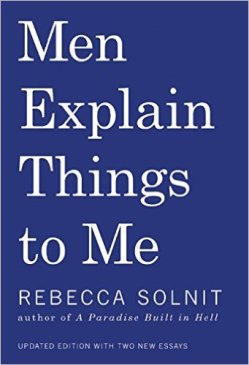The last time I attracted this many glances while reading on public transit was my sophomore year of college, when the entire sophomore class had to read the Bible and the Qoran as part of Contemporary Civilization. Naturally, being maniacal about schoolwork, I brought the books along on subway rides. So there I was, flipping through the Bible on the 1 Train , attracting the stares of people who though they knew me.
, attracting the stares of people who though they knew me.
A similar dynamic happened on the mornings I brought Men Explain Things to Me on the crowded train I take each morning to work. Only this time, I didn’t mind being typecast. I didn’t mind that men were looking at me reading a bold blue book with a bold white title. I’m happy everyone got to watch me nod righteously, be righteously angry, know that I wasn’t alone. I hope that all the men who gawked at me googled the book.
The essays are about how the cards are stacked against women, always have been. The essays are about the patriarchy and history and domestic violence, about power struggles and how individuals can be crushed under forces of apathy and cruelty. Such violence against women is structurally embedded into the system: how men behave, how law enforcement works. Such violence is allowed. Solnit is angry, yes, but her essays are based with facts and with proof, not emotion. This, of course, makes the essays scarier.
On the one hand, reading this book was satisfying because Solnit identifies a pervasive concept: mansplaining. But mostly, reading it made me angry. Putting a word on “mansplaining” doesn’t make it go away. Listing the awful statistics about domestic violence doesn’t make domestic violence go away. Lately I’ve been inarticulately angry — an anger so looming and large I’ve never been able to gather it into my hands, but like vapor it swirls around me as I walk through the world. I’m angry at the Big Powerful Forces, at having to live through this. How are we going to endure when Voldemort becomes president?
This book came out in 2014, back when I still thought we were headed towards some glittery land in the horizon called “progress.” In the essays Solnit concluded that while feminism has come a long way, there is so much longer to go. But she assured me that we were going there.
And yet. It’s 2017 now. Voldemort, tomorrow, will become the leader of the free world. In light of this, many of Solnit’s optimistic pronouncements ended up reading remarkably dated, like the whole book has been dipped into the present-day situation and came out dripping cruel irony.
Take an excerpt from this essay that she wrote condemning Dominique Strauss-Kahn’s assault of a maid.
“The United States has a hundred million flaws, but I am proud that the police believed this woman and that she will have her day in court. I am gratified this time not to be in a country that has decided that the career of a powerful man or the fate of an international institution matters more than this woman and her rights and well-being. This is what we mean by democracy: that everyone has a voice, that no one gets away with things just because of their wealth, power, race, or gender.”
And yet. It’s 2017, and 20 women have accused Voldemort Trump of sexual assault. A recently married Voldemort Trump said that grabbing a woman “by the pussy” was an acceptable means of seduction. All of this came out before November 8, and yet he still got elected. And to think — we could’ve had a woman in the White House. It’s not just that he won — it’s who didn’t win.
So, yeah, I’m angry. And confused. And want to reread this book and give it to anyone I know so they don’t fall asleep on what is happening and what will keep happening if we keep falling asleep.